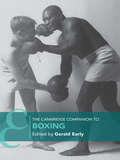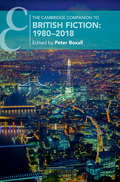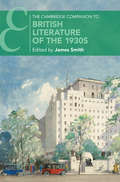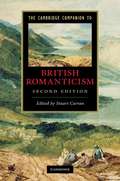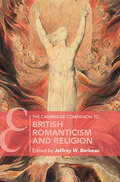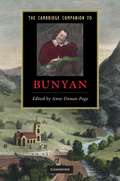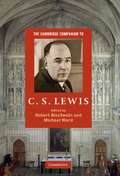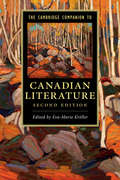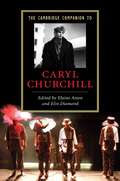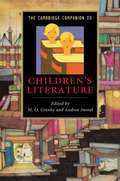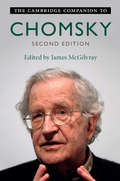- Table View
- List View
The Cambridge Companion to Ben Jonson
by Richard Harp Stanley StewartBen Jonson is, in many ways, the figure of greatest centrality to literary study of the Elizabethan and Jacobean period. He wrote in virtually every literary genre: in drama, comedy, tragedy and masque; in poetry, epigram, epistle and lyric; in prose, literary criticism and English grammar. He became the most visible poet of his age, honored more than even William Shakespeare, and his dramatic works, in particular his major comedies, continue to be performed today. This Companion brings together leading scholars from both sides of the Atlantic to provide an accessible and up-to-date introduction to Jonson's life and works. It represents an invaluable guide to current critical perspectives, providing generous coverage not only of his plays but also his non-dramatic works. The volume is informed by the latest development in Jonson scholarship and will therefore appeal to scholars and teachers as well as newcomers to his work.
The Cambridge Companion to Boxing (Cambridge Companions to Literature)
by Gerald EarlyWhile humans have used their hands to engage in combat since the dawn of man, boxing originated in Ancient Greece as an Olympic event. It is one of the most popular, controversial and misunderstood sports in the world. For its advocates, it is a heroic expression of unfettered individualism. For its critics, it is a depraved and ruthless physical and commercial exploitation of mostly poor young men. This Companion offers engaging and informative essays about the social impact and historical importance of the sport of boxing. It includes a comprehensive chronology of the sport, listing all the important events and personalities. Essays examine topics such as women in boxing, boxing and the rise of television, boxing in Africa, boxing and literature, and boxing and Hollywood films. A unique book for scholars and fans alike, this Companion explores the sport from its inception in Ancient Greece to the death of its most celebrated figure, Muhammad Ali.
The Cambridge Companion to Brecht
by Peter Thomson Glendyr SacksThis Companion offers students crucial guidance on virtually every aspect of the work of this complex and controversial writer, bringing together the contrasting views of major critics and active practitioners. The opening essays place Brecht's creative work in its historical and biographical context and are followed by chapters on single texts, from The Threepenny Opera to The Caucasian Chalk Circle, on some early plays, on the Lehrstücke and on the neglected contribution of Elisabeth Hauptmann to the Brecht canon. The third group of essays analyse Brecht's directing, his theatrical theories, his poetry, his interest in music, his significant collaboration with stage designers and his work with actors, concluding with an assessment of Brecht's continuing influence on theatre practice. A detailed calendar of Brecht's life and work and a selective bibliography of English criticism complete this provocative overview of a writer who constantly aimed to provoke.
The Cambridge Companion to British Black and Asian Literature (1945–2010)
by Deirdre OsborneThis Companion offers a comprehensive account of the influence of contemporary British Black and Asian writing in British culture. While there are a number of anthologies covering Black and Asian literature, there is no volume that comparatively addresses fiction, poetry, plays and performance, and provides critical accounts of the qualities and impact within one book. It charts the distinctive Black and Asian voices within the body of British writing and examines the creative and cultural impact that African, Caribbean and South Asian writers have had on British literature. It analyzes literary works from a broad range of genres, while also covering performance writing and non-fiction. It offers pertinent historical context throughout, and new critical perspectives on such key themes as multiculturalism and evolving cultural identities in contemporary British literature. This Companion explores race, politics, gender, sexuality, identity, amongst other key literary themes in Black and Asian British literature. It will serve as a key resource for scholars, graduates, teachers and students alike.
The Cambridge Companion to British Fiction since 1945.: The Cambridge Companion to British Fiction since 1945
by David JamesThis Companion offers a compelling engagement with British fiction from the end of the Second World War to the present day. Since 1945, British literature has served to mirror profound social, geopolitical and environmental change. Written by a host of leading scholars, this volume explores the myriad cultural movements and literary genres that have affected the development of postwar British fiction, showing how writers have given voice to matters of racial, regional and sexual identity. Covering subjects from immigration and ecology to science and globalism, this Companion draws on the latest critical innovations to provide insights into the traditions shaping the literary landscape of modern Britain, thus making it an essential resource for students and specialists alike.
The Cambridge Companion to British Fiction: 1980–2018 (Cambridge Companions to Literature)
by Peter BoxallFrom 1980 to the present, huge transformations have occurred in every area of British cultural life. The election of Margaret Thatcher in 1979 ushered in a new neoliberal era in politics and economics that dramatically reshaped the British landscape. Alongside this political shift, we have seen transformations to the public sphere caused by the arrival of the internet and of social media, and changes in the global balance of power brought about by 9/11, the emergence of China and India as superpowers, and latterly the British vote to leave the European Union. British fiction of the period is intimately interwoven with these historical shifts. This collection brings together some of the most penetrating critics of the contemporary, to explore the role that the British novel has had in shaping the cultural landscape of our time, at a moment, in the wake of the EU referendum of 2016, when the question of what it means to be British has become newly urgent.
The Cambridge Companion to British Literature of the 1930s (Cambridge Companions to Literature)
by James SmithThe 1930s is frequently seen as a unique moment in British literary history, a decade where writing was shaped by an intense series of political events, aesthetic debates, and emerging literary networks. Yet what is contained under the rubric of 1930s writing has been the subject of competing claims, and therefore this Companion offers the reader an incisive survey covering the decade's literature and its status in critical debates. Across the chapters, sustained attention is given to writers of growing scholarly interest, to pivotal authors of the period, such as Auden, Orwell, and Woolf, to the development of key literary forms and themes, and to the relationship between this literature and the decade's pressing social and political contexts. Through this, the reader will gain new insight into 1930s literary history, and an understanding of many of the critical debates that have marked the study of this unique literary era.
The Cambridge Companion to British Literature of the French Revolution in the 1790s
by Pamela ClemitThe French Revolution ignited the biggest debate on politics and society in Britain since the Civil War 150 years earlier. The public controversy lasted from the initial, positive reaction to French events in 1789 to the outlawing of the radical societies in 1799. This Cambridge Companion highlights the energy, variety and inventiveness of the literature written in response to events in France and the political reaction at home. It contains thirteen specially commissioned essays by an international team of historians and literary scholars, a chronology of events and publications, and an extensive guide to further reading. Six essays concentrate on the principal writers of the Revolution controversy: Burke, Paine, Godwin and Wollstonecraft. Others deal with popular radical culture, counter-revolutionary culture, the distinctive contribution of women writers, novels of opinion, drama, and poetry. This volume will serve as a comprehensive yet accessible reference work for students, advanced researchers and scholars.
The Cambridge Companion to British Poetry, 1945–2010.: The Cambridge Companion to British Poetry, 1945–2010
by Edward LarrissyThe Cambridge Companion to British Poetry, 1945–2010 brings together sixteen essays that explore the full diversity of British poetry since the Second World War, a period of significant achievement in which varied styles and approaches have flourished. As a comprehensive critical, literary-historical and scholarly guide, this Companion offers not only new readings of a wide range of poets but a detailed account of the contexts in which their verse was written and received. Focusing on famous and neglected names alike, from Dylan Thomas to John Agard, leading scholars provide readers with insight into the ongoing importance and profundity of post-war poetry.
The Cambridge Companion to British Romantic Poetry
by James Chandler Maureen N. MclaneMore than any other period of British literature, Romanticism is strongly identified with a single genre. Romantic poetry has been one of the most enduring, best loved, most widely read and most frequently studied genres for two centuries and remains no less so today. This Companion offers a comprehensive overview and interpretation of the poetry of the period in its literary and historical contexts. The essays consider its metrical, formal, and linguistic features; its relation to history; its influence on other genres; its reflections of empire and nationalism, both within and outside the British Isles; and the various implications of oral transmission and the rapid expansion of print culture and mass readership. Attention is given to the work of less well-known or recently rediscovered authors, alongside the achievements of some of the greatest poets in the English language: Wordsworth, Coleridge, Blake, Scott, Burns, Keats, Shelley, Byron and Clare.
The Cambridge Companion to British Romanticism
by Stuart CurranThis new edition of The Cambridge Companion to British Romanticism has been fully revised and updated and includes two wholly new essays, one on recent developments in the field, and one on the rapidly expanding publishing industry of this period. It also features a comprehensive chronology and a fully up-to-date guide to further reading. For the past decade and more the Companion has been a much-admired and widely-used account of the phenomenon of British Romanticism that has inspired students to look at Romantic literature from a variety of critical angles and approaches. In this new incarnation, the volume will continue to be a standard guide for students of Romantic literature and its contexts.
The Cambridge Companion to British Romanticism and Religion (Cambridge Companions to Literature)
by Jeffrey BarbeauThe Cambridge Companion to British Romanticism and Religion provides the first scholarly survey of the connections between literature, religion, and intellectual life during the British Romantic period (1780s–1832). Part I, 'Historical Developments,' examines diverse religious communities, texts, and figures that shaped British Romantic culture, investigating the influence of Christianity, Judaism, Islam, Hinduism, and atheism on the literature of the times. Part II, 'Literary Forms,' considers British Romanticism and religion through attention to major genres such as poetry, the novel, drama, sermons and lectures, and life writing. Part III, 'Disciplinary Connections,' explores links between religion, literature, and other areas of intellectual life during the period, including philosophy, science, politics, music, and painting.
The Cambridge Companion to Bunyan
by Anne Dunan-Page"John Bunyan was a major figure in seventeenth-century Puritan literature, and one deeply embroiled in the religious upheavals of his times. This Companion considers all his major texts, including The Pilgrim's Progress and his autobiography Grace Abounding. The essays, by leading Bunyan scholars, place these and his other works in the context of seventeenth-century history and literature. They discuss such key issues as the publication of dissenting works, the history of the book, gender, the relationship between literature and religion, between literature and early modern radicalism, and the reception of seventeenth-century texts. Other chapters assess Bunyan's importance for the development of allegory, life-writing, the early novel and children's literature. This Companion provides a comprehensive and accessible introduction to an author with an assured and central place in English literature"--Provided by publisher.
The Cambridge Companion to Byron
by Drummond BoneByron's life and work have fascinated readers around the world for two hundred years, but it is the complex interaction between his art and his politics, beliefs and sexuality that has attracted so many modern critics and students. In three sections devoted to the historical, textual and literary contexts of Byron's life and times, these specially commissioned essays by a range of eminent Byron scholars provide a compelling picture of the diversity of Byron's writings. The essays cover topics such as Byron's interest in the East, his relationship to the publishing world, his attitudes to gender, his use of Shakespeare and eighteenth-century literature, and his acute fit in a post-modernist world. This Companion provides an invaluable resource for students and scholars, including a chronology and a guide to further reading.
The Cambridge Companion to C.S. Lewis
by Michael Ward Robert MacswainA distinguished academic, influential Christian apologist, and best-selling author of children's literature, C. S. Lewis is a controversial and enigmatic figure who continues to fascinate, fifty years after his death. This 2010 Companion is a comprehensive single-volume study written by an international team of scholars to survey Lewis's career as a literary historian, popular theologian, and creative writer. Twenty-one expert voices from Oxford, Cambridge, Princeton, and Wheaton, among many other places of learning, analyze Lewis's work from theological, philosophical, and literary perspectives. Some chapters consider his professional contribution to fields such as critical theory and intellectual history, while others assess his views on issues including moral knowledge, gender, prayer, war, love, suffering, and Scripture. The final chapters investigate his work as a writer of fiction and poetry. Original in its approach and unique in its scope, this Companion shows that C. S. Lewis was much more than merely the man behind Narnia.
The Cambridge Companion to Camus
by Edward J. HughesAlbert Camus is one of the iconic figures of twentieth-century French literature, one of France's most widely read modern literary authors and one of the youngest winners of the Nobel Prize for Literature. As the author of L'Etranger and the architect of the notion of 'the Absurd' in the 1940s, he shot to prominence in France and beyond. His work nevertheless attracted hostility as well as acclaim and he was increasingly drawn into bitter political controversies, especially the issue of France's place and role in the country of his birth, Algeria. Most recently, postcolonial studies have identified in his writings a set of preoccupations ripe for revisitation. Situating Camus in his cultural and historical context, this Companion explores his best-selling novels, his ambiguous engagement with philosophy, his theatre, his increasingly high-profile work as a journalist and his reflection on ethical and political questions that continue to concern readers today.
The Cambridge Companion to Canadian Literature (Cambridge Companions to Literature)
by Kröller Eva-MarieThis book offers a comprehensive and lively introduction to major writers, genres and topics in Canadian literature. Addressing traditional assumptions and current issues, contributors pay attention to the social, political and economic developments that have informed literary events. Broad surveys of fiction, drama, and poetry are complemented by chapters on Aboriginal writing, autobiography, literary criticism, writing by women, and the emergence of urban writing in a country historically defined by its regions. Also discussed are genres that have a special place in Canadian literature, such as nature-writing, exploration and travel-writing, and short fiction. Athough the emphasis is on literature in English, a substantial chapter on francophone writing is included.
The Cambridge Companion to Caryl Churchill
by Elaine Aston Elin DiamondCaryl Churchill's plays are internationally performed, studied and acclaimed by practitioners, theatre scholars, critics and audiences alike. With fierce imagination the plays dramatise the anxieties and terrors of contemporary life. This Companion presents new scholarship on Churchill's extraordinary and ground-breaking work. Chapters explore a cluster of major plays in relation to pressing social topics - ecological crisis, sexual politics, revolution, terror and selfhood - providing close readings of texts in their theatrical, theoretical and historical contexts. These topic-based essays are intercalated with other essays that delve into Churchill's major collaborations, her performance innovations and her influences on a new generation of playwrights. Contributors explore Churchill's career-long experimentation - her risk-taking that has reinvigorated the stage, both formally and politically. Providing a new critical platform for the study of a theatrical career that spans almost fifty years, the Companion pays fresh attention to Churchill's poetic precision, dark wit and inexhaustible creativity.
The Cambridge Companion to Cervantes
by Anthony J. CascardiDon Quixote de la Mancha (1605) is one of the classic texts of Western literature and the foundation of European fiction. Yet Cervantes himself remains an enigmatic figure. The Cambridge Companion to Cervantes, first published in 2002, offers a comprehensive treatment of Cervantes' life and work, including his lesser known writing. The essays, by some of the most outstanding scholars in the field, cover the historical and political context of Cervantes' writing, his place in Renaissance culture, and the role of his masterpiece, Don Quixote, in the formation of the modern novel. They draw on contemporary critical perspectives to shed new light on Cervantes' work, including the 'Exemplary Novels', the plays and dramatic interludes, and the long romances, Galatea and Persiles. The volume provides useful supporting material for students; suggestions for further reading, a detailed chronology, a complete list of his published writings, an overview of translations and editions, and a guide to electronic resources.
The Cambridge Companion to Charles Dickens
by John O. JordanThe Cambridge Companion to Charles Dickens contains fourteen specially-commissioned chapters by leading international scholars, who together provide diverse but complementary approaches to the full span of Dickens's work, with particular focus on his major fiction. The essays cover the whole range of Dickens's writing, from Sketches by Boz through The Mystery of Edwin Drood. Separate chapters address important thematic topics: childhood, the city, and domestic ideology. Others consider formal features of the novels, including their serial publication and Dickens's distinctive use of language. Three final chapters examine Dickens in relation to work in other media: illustration, theatre, and film. Each essay provides guidance to further reading. The volume as a whole offers a valuable introduction to Dickens for students and general readers, as well as fresh insights, informed by recent critical theory, that will be of interest to scholars and teachers of the novels.
The Cambridge Companion to Chaucer
by Piero Boitani Jill MannThis revised edition is based on the first edition which has become a classic in Chaucer studies. Important material has been updated in the text, and its contributions cover recent trends in literary theory as well as in studies of Chaucer's works. The bibliography has been completely revised to provide an indispensable guide for today's student of Chaucer. First Edition Hb (1986): 0-521-30422-9 First Edition Pb (1986): 0-521-31689-8
The Cambridge Companion to Chekhov
by Vera Gottlieb Paul AllainThis volume of specially commissioned essays explores the world of Anton Chekhov - one of the most important dramatists in the repertoire - and the creation, performance and interpretation of his works. The Companion begins with an examination of Chekhov's life, his Russia, and the original productions of his plays at the Moscow Art Theatre. Later film versions and adaptations of Chekhov's works are analysed, with valuable insights also offered on acting Chekhov, by Ian McKellen, and directing Chekhov, by Trevor Nunn and Leonid Heifetz. The volume also provides essays on â special topics' such as Chekhov as writer, Chekhov and women, and the Chekhov comedies and stories. Key plays, such as The Cherry Orchard and The Seagull, receive dedicated chapters while lesser-known works and genres are also brought to light. The volume concludes with appendices of primary sources, lists of works, and a select bibliography.
The Cambridge Companion to Children's Literature
by M. O. Grenby Andrea ImmelSome of the most innovative and spell-binding literature has been written for young people, but only recently has academic study embraced its range and complexity. This Companion offers a state-of-the-subject survey of English-language children's literature from the seventeenth century to the present. With discussions ranging from eighteenth-century moral tales to modern fantasies by J. K. Rowling and Philip Pullman, the Companion illuminates acknowledged classics and many more neglected works. Its unique structure means that equal consideration can be given to both texts and contexts. Some chapters analyse key themes and major genres, including humour, poetry, school stories, and picture books. Others explore the sociological dimensions of children's literature and the impact of publishing practices. Written by leading scholars from around the world, this Companion will be essential reading for all students and scholars of children's literature, offering original readings and new research that reflects the latest developments in the field.
The Cambridge Companion to Chomsky
by James McgilvrayNoam Chomsky is one of the most influential thinkers of modern times. The most cited writer in the humanities, his work has revolutionised the field of linguistics, and has dominated many other disciplines including politics and the philosophy of mind and human nature. He has also contributed significantly to our understanding of the abuse of power, and of the controlling effects of the mass media. This companion brings together a team of leading linguists, philosophers, cognitive scientists and political theorists to consolidate the disparate strands of Chomsky's thought into one accessible volume. Through a range of chapters focusing on the various aspects of his work, they introduce in a clear and non-technical way the central themes of his extraordinary effect on our understanding of language, mind, and the abuse of political power. Comprehensive and informative, this is an essential guide to one of the leading intellectual figures of our time.
The Cambridge Companion to Chomsky
by James McgilvrayThis completely new edition of The Cambridge Companion to Chomsky surveys Chomsky's contributions to the science of language, to socioeconomic-political analysis and criticism, and to the study of the human mind. The first section focuses on the aims of Chomsky's recent 'biological-minimalist' turn in the science of language, and shows how Chomsky's view of the nature of language and its introduction to the human species has recently developed. The second section focuses on Chomsky's view of the mind and its parts - and how to study them. Finally, the third section examines some of Chomsky's many contributions to socio-political history and critique. This new edition examines Chomsky's views on a wide range of issues, from his views of the lexicon, language's evolution, and the study of mind to the status of capitalism and the Palestine-Israel conflict. It will be essential reading for anyone with an interest in Chomsky's ideas.

